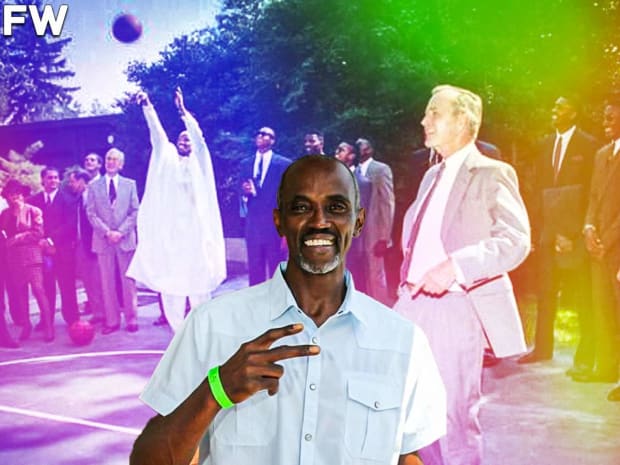Craig Hodges: How The NBA Blackballed The Chicago Bulls' Sharpshooter
Craig Hodges, a 3x three-point contest winner, spoke out on social injustices and was blackballed by the NBA.

Credit: Fadeaway World
The NBA has seen many incredible shooters during its time. Of course, there's Stephen Curry, Klay Thompson, Ray Allen, Reggie Miller, and Larry Bird, just to name a few.
But what if I gave you the name Craig Hodges? Did you know he was arguably the best three-point shooter in the NBA during the late 1980s and early 1990s?
It's okay if the name doesn't sound familiar. There may be a reason for that, and this is the topic of this article. We will discuss how the NBA blackballed Craig Hodges.
Craig Hodges: A Three-Point Champ That Fell Off The Map
Craig Hodges was a sharpshooter who played for four teams in his career, but he is most remembered for his time with the Michael Jordan-led Chicago Bulls. As a member of the Bulls, Hodges won two NBA championships and three consecutive All-Star Weekend three-point contests.
Even before Hodges landed in Chicago, he led the league in three-point percentage two times, in 1985-86 with the Milwaukee Bucks and 1987-88 with the Bucks and the Phoenix Suns. But after the 1991-92 season, Hodges was out of the league.
Why did Hodges leave the NBA after winning two NBA titles in a row? It wasn't by choice, that's for sure. So, what was the reason?
Let's start first by looking at Craig Hodges himself and what he stood for in life. Hodges was big on speaking out on social issues, as he was a major activist.
Today, we see many NBA players speak up on social injustices, and we see the league itself speak out and show support to marginalized communities. Back in 1992, however, the NBA wasn't too keen on its players speaking up on these types of issues.
The NBA's problems with Hodges actually began in 1991, during the 1991 NBA Finals, the first in Chicago Bulls' history. Only about three months prior to the start of the NBA Finals, the United States and Los Angeles, in particular, saw the outrageous beating of Rodney King by the Los Angeles Police Department.
The Bulls were playing the Los Angeles Lakers, and Game 1 was held in LA. Hodges wanted the big-name players in the series, Michael Jordan and Magic Johnson, to lead a boycott of Game 1 in response to King's beating by the LAPD. This didn't happen, of course.
By the time Game 1 of the 1992 NBA Finals came around, Hodges called out his teammate, Michael Jordan, for not speaking about the LA riots that followed King's beating. Hodges knew his voice didn't carry much weight, but Jordan's did, but MJ wasn't one to get involved in those types of issues at the time.
After the Bulls defeated the Portland Trail Blazers in the 1992 NBA Finals, the Bulls met President George H. W. Bush at the White House, which is a tradition for a championship-winning sports team to do. Hodges decided this was the perfect time to make a statement.
Hodges showed up to the White House wearing a dashiki, and he hand-delivered a note he wrote to President Bush. The note told the president about the unfair treatment of the poor and minorities by the Bush administration.
(Starts at 1:10)
“Mr. President,
The athletes from the Chicago Bulls, number 12, 10 of whom are the descendants of African slaves, I’ve taken on the responsibility to speak on behalf of those who are not able to be heard from where they are.
We have a sector of our population that is being described as an ‘endangered species' i.e. the young black man.
The question must be asked why is the condition of the inner cities around the country in a state of emergency because of wanton violence, lack of jobs, or drugs.
It is very important that the citizens of this great nation make a determination on what side of the history we will be on in this most critical hour.”
On July 10th, 1992, Hodges was surprisingly waived by the Chicago Bulls. The reason given to Hodges was the Bulls were looking to add younger players to the roster. This came against the wishes of Bulls head coach Phil Jackson, as he wanted to keep Hodges on the team.
“I also found it strange that not a single team called to inquire about him,” Jackson said in an interview with the New York Times. “Usually, I get at least one call about a player we’ve decided not to sign. And yes, he couldn’t play much defense, but a lot of guys in the league can’t, but not many can shoot from his range, either.”
Hodges would never play again in the NBA, and it truly looked like the league blackballed him. In 1996, Hodges filed a $40 million lawsuit against the NBA, citing the league blackballing him, but he'd lose his suit.
Hodges would eventually find himself back in the NBA, thanks to Phil Jackson. In 2005, Jackson hired Hodges as a special assistant for the Lakers, and he stayed with the team until Jackson retired in 2011.
The NBA being at the forefront of speaking out against social injustices is good to see. Unfortunately, the NBA didn't act this way during Craig Hodges' playing career.
Craig Hodges deserves to be recognized for his activism, and we all, including current players, should honor the former Bulls sharpshooter for being ahead of his time.
We sincerely appreciate and respect you as a reader of our site. It would help us a lot if you follow us on Google News because of the latest update.
Thanks for following us. We really appreciate your support.
Post a Comment
0 Comments